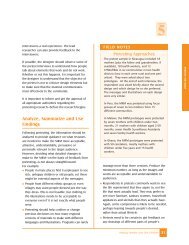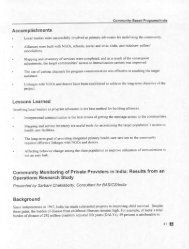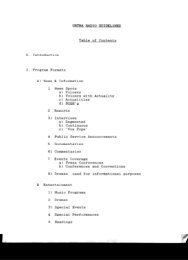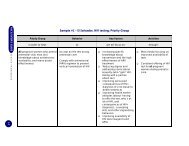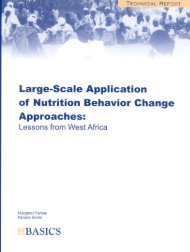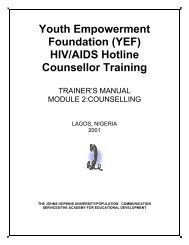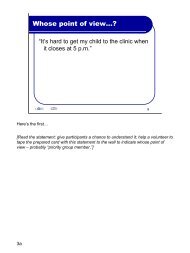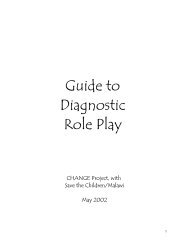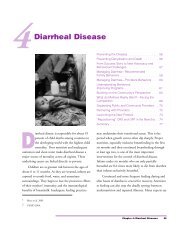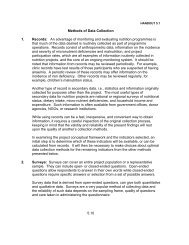MODULE TWO: COUNSELLING - FHI 360 Center for Global Health ...
MODULE TWO: COUNSELLING - FHI 360 Center for Global Health ...
MODULE TWO: COUNSELLING - FHI 360 Center for Global Health ...
Create successful ePaper yourself
Turn your PDF publications into a flip-book with our unique Google optimized e-Paper software.
• People who have lost a loved one to AIDS or who have found out that they<br />
themselves are HIV-positive may be so upset that they are considering<br />
suicide.<br />
• Women who are raped run the risk of being infected with HIV.<br />
• Women who test positive <strong>for</strong> HIV may fear abuse from their husbands or<br />
partners if they find out. Also, women in abusive relationships are often<br />
unable to negotiate safer sex behaviours such as condom use.<br />
• HIV-positive people may be fired from their jobs due to discrimination.<br />
• Anger is a common reaction among those who have just learned that they<br />
themselves or someone they love is HIV-positive. Anger can also surface<br />
after an AIDS-related death.<br />
• Depression can affect both those who are HIV-positive and those who have a<br />
loved one affected by HIV/AIDS.<br />
• Drug and alcohol use can be a risk factor <strong>for</strong> acquiring HIV and also a<br />
reaction to living with HIV. People who are HIV-positive themselves or who<br />
have loved ones infected with HIV may turn to drugs and alcohol to relieve<br />
their emotional distress and escape from reality.<br />
YEF Crisis Call Policy<br />
If YEF HIV/AIDS Hotline counsellors receive a crisis call that they do not feel<br />
capable of handling, they should refer the caller to the appropriate service.<br />
YEF HIV/AIDS HOTLINE CRISIS POLICY AND SIMPLE <strong>COUNSELLING</strong><br />
GUIDELINES<br />
The aim of this activity is to familiarise participants with the YEF HIV/AIDS<br />
Hotline policy regarding crisis calls and to identify strategies <strong>for</strong> dealing with<br />
specific types of crises.<br />
Crisis Call Policy<br />
If YEF HIV/AIDS Hotline counsellors receive a crisis call that they do not feel<br />
capable of handling, they should refer the caller to the appropriate service.<br />
General Guidelines <strong>for</strong> Crisis Counselling<br />
1. Remain calm and stable. Encourage the client to express his/her feelings<br />
2. Allow the client full opportunity to speak.<br />
3. Attempt to determine the type of crisis, what caused it and how severe it is.<br />
4. Deal with the immediate situation rather than its underlying, unconscious<br />
causes that may be left <strong>for</strong> later.<br />
5. Help the client break down the problem into smaller parts and identify which<br />
parts of the problem that s/he can do something about. Help him/her to set<br />
realistic goals.<br />
6. Help him/her decide exactly what s/he is gong to do when s/he hangs up.<br />
7. Stay focused on the basic practical issues and immediate needs.<br />
8. Have a list of YEF local resources readily available.<br />
Session 7- Pg. 7



